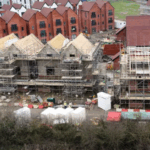Fine Gael has announced plans to permanently reduce the VAT rate for food-based hospitality, entertainment, and hairdressing sectors to 11%, should the party return to government. The proposal, revealed by party leader Simon Harris, would take effect within 100 days of taking office. Harris emphasized that the decision was driven by the financial pressures facing small and medium-sized businesses.
“We want to support businesses that are struggling, especially small and medium enterprises, many of which have tight margins,” Harris said during a business policy launch event. The party also intends to introduce a temporary three-year measure offering a PRSI rebate for businesses with fewer than 50 employees.
Finance Minister Paschal Donohoe backed the plan, stating that it would create 300,000 new jobs over the course of the next government, bringing total employment in the country to three million. He explained that hotels would not benefit from the VAT reduction directly, as “choices had to be made,” although the food component of hotel services would still see a tax cut.
Despite Fine Gael’s optimism, the VAT proposal has sparked mixed reactions from other political parties. Fianna Fáil leader Micheál Martin expressed conditional support for the reduction but raised concerns about the potential knock-on effects for small businesses, particularly in the context of rising energy and fuel costs. “Lowering VAT for some sectors could lead to price hikes in others, which could hurt small businesses like gyms and others not included in the VAT reduction,” Martin said during a visit to the Douglas Shopping Centre in Cork.
Sinn Féin, led by Mary Lou McDonald, has already committed to reducing the VAT rate for hospitality to 9%. McDonald criticized Fine Gael for what she described as “last-minute policy-making,” calling their proposal “extraordinary” following the passage of a recent Finance Bill. She reiterated Sinn Féin’s aim to offer voters a “real choice” in this election, focusing on a government free from the influence of either Fine Gael or Fianna Fáil.
Meanwhile, the Social Democrats, led by Holly Cairns, have proposed a 9% VAT rate for the food and beverage sector, but have excluded accommodation businesses from the plan. Cairns argued that it is unfair to compare large hotel chains charging high room rates with small local cafes. The Social Democrats view their proposal as a critical support measure for struggling small businesses, particularly in towns and villages facing potential closures.
In other political news, Fianna Fáil has pledged to expand the Garda force by 5,000 officers, addressing public concerns about rising crime rates. Labour leader Ivana Bacik and People Before Profit leader Richard Boyd Barrett are also participating in a national march for Palestine in Dublin.
As election day approaches, political parties are focusing on issues such as housing, the cost of living, and public spending, with just under three weeks left to outline their plans to voters.
















